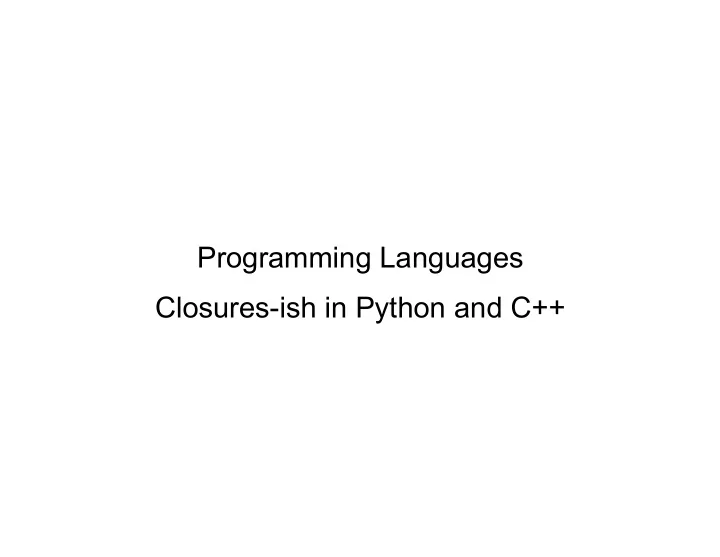

Programming Languages Closures-ish in Python and C++
Higher-order programming • Higher-order programming, e.g., with map and filter , is great • Language support for closures makes it very pleasant • Without closures, we can still do it more manually / clumsily – In OOP (e.g., C++) with classes with private members – Python has closures, though they are slightly clunky • Working through this: – Shows connections between languages and features – Can help you understand closures and objects Fall 2011 CSE341: Programming Languages 2
C++ • In the beginning, there was the function pointer. – Not a substitute for full-fledged closures, because a function pointer points to code only, no environment. Fall 2011 CSE341: Programming Languages 3
C++ • In the beginning, there was the function pointer. – Not a substitute for full-fledged closures, because a function pointer points to code only, no environment. • Then came objects, capable of having "private data" by using private members. – People started using "function objects" by creating classes that overload the parentheses operator (yes, you can do that). Fall 2011 CSE341: Programming Languages 4
C++ • In the beginning, there was the function pointer. – Not a substitute for full-fledged closures, because a function pointer points to code only, no environment. • Then came objects, capable of having "private data" by using private members. – People started using "function objects" by creating classes that overload the parentheses operator (yes, you can do that). • In 2011, the C++ standard was updated to include "function objects" as well as lambdas. – This is super-awesome and really cool, but not all compilers support everything yet. Fall 2011 CSE341: Programming Languages 5
Lambda expressions in C++ [ capture option ] ( args ) { block of code } C++ will try to automatically figure out the return type for you, but if it can't, you can also do: [ capture option ] ( args ) -> returnType { block of code } Fall 2011 CSE341: Programming Languages 6
Lambda expressions in C++ [ capture option ] ( args ) { block of code } The "capture option" tells C++ how to handle non-local variables in the block of code. [ ] means capture nothing (if you have no non-locals) [=] means capture non-locals by value (make a copy) [&] means capture non-locals by reference (don't make a copy) Fall 2011 CSE341: Programming Languages 7
Map and filter • Part of the C++ algorithms library – map is called "transform" – many of these higher-order functions don't use vectors or arrays directly, but operate on "iterators." – An iterator is a data type that expresses the abstraction of a "sequence," whether that sequence is implemented as a vector, array, or looping through some other data structure – other things that have iterators • strings (sequence of characters) • keys in a hashtable Fall 2011 CSE341: Programming Languages 8
Python • Python has fewer hoops to jump through because the language was designed with closures in mind (e.g., nested function defs are OK). – C++'s "closures" (which aren't really closures) had to be hacked in later. • Syntax is cleaner in Python as well because no capture by value/capture by reference, plus no data type declarations needed because it's a dynamically typed language. – Summary: syntax closer to Racket/Scheme's syntax. Fall 2011 CSE341: Programming Languages 9
Recommend
More recommend